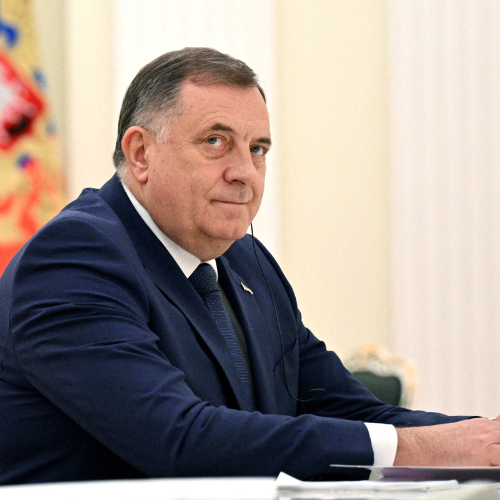The United States has taken a significant step to target a network connected to Milorad Dodik, the Bosnian Serb leader, by imposing sanctions on him and several individuals and companies tied to his activities. On Wednesday, the U.S. government blacklisted Milorad Dodik and others as part of an ongoing effort to hold him accountable for his actions, which the U.S. believes are threatening peace and stability in the Balkan region.
A Web of Corruption and Evasion
Milorad Dodik has been under U.S. sanctions since 2022, following accusations of corruption and efforts to undermine the stability of Bosnia and Herzegovina. The U.S. government alleges that Dodik has been trying to break away from the country by promoting secession, a move that directly challenges the peace agreements that ended the Bosnian War in 1995. His actions have been seen as destabilizing and harmful to the region’s fragile peace.
Despite being sanctioned, Milorad Dodik and his family have managed to evade the full impact of these measures. U.S. officials say that Dodik’s family, including his son Igor Dodik and daughter Gorica Dodik, have continued their operations by using clever tactics to hide their control over several companies. Instead of owning these businesses directly, they use trusted associates to run the companies for them. They also rebrand the businesses and manipulate management structures to make it harder for authorities to trace the companies back to Milorad Dodik and his family.
Family Members and Close Associates Involved
In addition to Milorad Dodik, the U.S. imposed sanctions on other key figures in his network. One of these individuals is his son, Igor Dodik, who is believed to be heavily involved in the family’s business dealings. Igor has been linked to multiple companies that the U.S. believes are part of the scheme to evade sanctions. For example, one of the companies, Nimbus Innovations, was previously called Sirius 2010. When Sirius was sanctioned in June, the company changed its name to Nimbus and continued operating from the same location. U.S. officials argue that Nimbus took over the assets, operations, and liabilities of Sirius, continuing the same business activities under a different name to hide the family’s involvement.
Corruption Network Exposed: Bosnia’s Milorad Dodik Faces New Sanctions
Another family member, Aleksandar Dobric, Igor Dodik’s 33-year-old cousin, was also sanctioned. Aleksandar set up a company in Republika Srpska initially called Agape Best. After this company was sanctioned in October 2023, its name was changed to Best Service in an attempt to evade detection. Mirko Dobric, Aleksandar’s father, was also included in the sanctions list for co-owning a company called Fruit Echo. After being sanctioned, Fruit Echo rebranded itself as Zelena Jabuka to continue its operations under a new name.
In addition to Milorad Dodik’s family, other individuals close to him are also involved in this sanctions evasion network. Vlatko Vukotic, for example, owns and runs a company called Vorto, which is connected to Igor Dodik. U.S. officials allege that Igor Dodik has been giving instructions on how Vorto should operate, making it another business controlled indirectly by Milorad Dodik and his family.
Dodik’s Political Influence and Manipulation
The U.S. also imposed sanctions on Stasa Kosarac, Bosnia and Herzegovina’s Minister of Foreign Trade and Economic Relations and a prominent member of Milorad Dodik’s political party, the Alliance of Independent Social Democrats. Kosarac is accused of using his political position to assist Dodik’s efforts to weaken state-level institutions in Bosnia and Herzegovina for Dodik’s benefit. This is seen as part of Dodik’s broader plan to strengthen his influence in Republika Srpska and continue pushing for secession from the rest of Bosnia.
By targeting both business figures and political figures like Kosarac, the U.S. hopes to disrupt Dodik’s ability to continue his schemes. The sanctions are meant to limit his power and stop him from using his position to enrich himself and his associates. The U.S. Treasury Department has made it clear that it will continue to expose and hold accountable those who support Milorad Dodik’s actions.
In conclusion, the latest round of U.S. sanctions against Milorad Dodik’s network shines a light on the ongoing corruption within Bosnia and Herzegovina. Dodik and his family have been accused of using various strategies to conceal their wealth and influence, but the U.S. is determined to keep exposing these efforts and holding those involved responsible for their actions.


